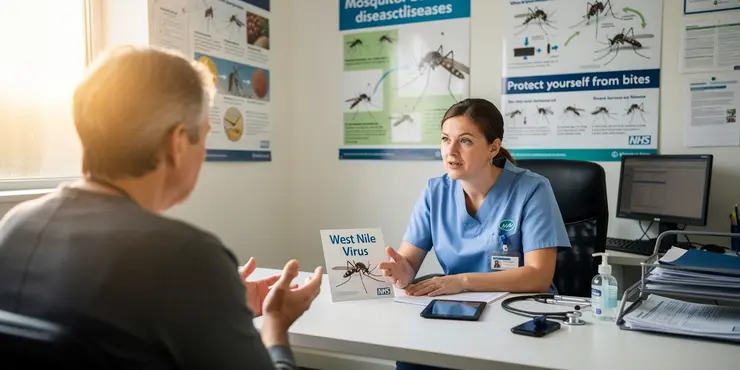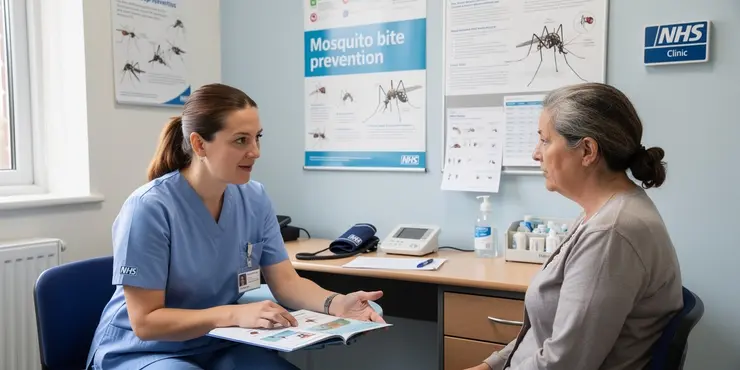
Find Help
More Items From Ergsy search
-

How is West Nile Virus transmitted?
Relevance: 100%
-

What is West Nile Virus?
Relevance: 97%
-

What is West Nile Virus?
Relevance: 96%
-

Is there a vaccine for West Nile Virus?
Relevance: 95%
-

How prevalent is West Nile virus in the UK?
Relevance: 94%
-

Is there a test for West Nile Virus?
Relevance: 94%
-

Are there treatments for West Nile Virus?
Relevance: 91%
-

Which countries are affected by West Nile Virus?
Relevance: 90%
-

What are the symptoms of West Nile Virus?
Relevance: 88%
-

Can pets get West Nile Virus?
Relevance: 86%
-

What should I do if I think I have West Nile Virus?
Relevance: 85%
-

How do health officials monitor West Nile Virus?
Relevance: 85%
-

Who is at risk for severe illness from West Nile Virus?
Relevance: 81%
-

Can mosquitoes carrying West Nile Virus be controlled?
Relevance: 60%
-

How can West Nile Virus be prevented?
Relevance: 60%
-

Can you get West Nile Virus more than once?
Relevance: 54%
-

What other viruses are tested for in blood donations?
Relevance: 51%
-

Are UK mosquitoes capable of transmitting Zika virus?
Relevance: 49%
-

What role do fruit bats play in Nipah Virus transmission?
Relevance: 45%
-

What diseases are spread by mosquitos in the UK in 2025?
Relevance: 44%
-

What is the Ebola virus?
Relevance: 39%
-

Are new variants more transmissible?
Relevance: 39%
-

When is West Nile Virus most active?
Relevance: 37%
-

Do all mosquitoes in the UK carry diseases?
Relevance: 37%
-

Is the Marburg virus related to the Ebola virus?
Relevance: 37%
-

How is blood screened to prevent disease transmission?
Relevance: 36%
-

How is Nipah Virus transmitted?
Relevance: 34%
-

How is the Zika virus transmitted?
Relevance: 34%
-

How is Chikungunya virus transmitted?
Relevance: 33%
-

How is the Marburg virus transmitted?
Relevance: 32%
-

Can West Nile Virus be transmitted from person to person?
Relevance: 32%
-

Can Nipah Virus be transmitted from person to person?
Relevance: 31%
-

What is Nipah Virus?
Relevance: 31%
-

Is there a cure for Nipah Virus?
Relevance: 31%
-

Which animals are known to carry Nipah Virus?
Relevance: 31%
-

Can Marburg virus disease be prevented?
Relevance: 31%
-

Can Zika virus be spread from person to person in the UK?
Relevance: 30%
-

Does the UK have Zika virus?
Relevance: 30%
-

Can men in the UK transmit Zika virus if infected?
Relevance: 30%
-

Is Zika virus present in the UK?
Relevance: 30%
Introduction to West Nile Virus
West Nile Virus (WNV) is a vector-borne disease that predominantly affects birds and can be transmitted to humans. Although the virus is more common in North America, Europe, Africa, and the Middle East, awareness of its transmission methods is crucial for understanding how it might affect people globally, including those in the UK.
Primary Transmission through Mosquitoes
The primary mode of transmission for West Nile Virus is through mosquito bites. Mosquitoes become infected when they feed on birds that carry the virus. Culex species mosquitoes are the primary vectors of WNV. Once a mosquito is infected, it can transmit the virus to humans and other animals through subsequent bites. This method of transmission is the most common and significant pathway through which WNV spreads.
Birds as Natural Hosts
Birds serve as the main reservoir hosts for West Nile Virus. Infected birds can have high levels of the virus in their bloodstream, which allows mosquitoes feeding on them to become infected. While many bird species may carry the virus, crows, jays, and other corvids are often severely affected and can die from the infection. The movement of infected migratory birds plays a crucial role in the geographic spread of the virus.
Other Transmission Methods
Other, less common transmission methods of West Nile Virus include blood transfusions, organ transplants, exposure to the virus in laboratory settings, and from mother to child during pregnancy, delivery, or breastfeeding. Rigorous screening of blood donations helps to minimize the risk of transmission through transfusions. The risk of transmission through these routes is relatively low compared to mosquito bites.
Human-to-Human Transmission
West Nile Virus is not transmitted from person to person through casual contact. There is no evidence to suggest that individuals can contract WNV from touching or caring for someone who is infected. As such, standard social interactions do not pose a risk of spreading the virus.
Prevention and Control Measures
Preventing West Nile Virus primarily involves controlling mosquito populations and minimizing exposure to mosquito bites. This can be achieved through the use of insect repellent, installing window and door screens, wearing long-sleeved clothing, and reducing standing water where mosquitoes breed. Public health initiatives to monitor and control mosquito populations are essential, especially in regions where the virus is prevalent.
Conclusion
Understanding how West Nile Virus is transmitted helps in the implementation of effective preventive measures, reducing the risk of infection. Continuing research and public awareness are essential in managing and controlling potential outbreaks, ensuring the health and safety of communities, including those in the UK.
Introduction to West Nile Virus
West Nile Virus (WNV) is a sickness caused by a virus. This virus mostly affects birds, but people can get it too. The virus is common in places like North America, Europe, Africa, and the Middle East. People need to know how the virus spreads to understand how it can affect them, even in the UK.
Primary Transmission through Mosquitoes
West Nile Virus spreads mainly through mosquito bites. Mosquitoes get the virus when they bite birds that have it. Special kinds of mosquitoes called Culex are the main ones that spread the virus. After a mosquito is infected, it can bite people and other animals and give them the virus. This is how the virus spreads the most.
Birds as Natural Hosts
Birds are the main carriers of West Nile Virus. Infected birds have a lot of the virus in their blood. When mosquitoes bite these birds, they get infected too. Many different birds can have the virus, but crows and jays are often badly affected and can die. When birds fly to new places, they can spread the virus further.
Other Transmission Methods
The virus can also spread through other ways, but these are less common. It can spread through blood transfusions, organ transplants, in labs, and from mother to baby during birth or breastfeeding. Blood donations are checked carefully to make this kind of spreading less likely. These ways are not as common as mosquito bites.
Human-to-Human Transmission
People cannot spread West Nile Virus to each other by touching or being near one another. You cannot catch it from spending time with an infected person. So, normal social activities are safe.
Prevention and Control Measures
To stop West Nile Virus, we must control mosquitoes and avoid their bites. Use bug spray, put up screens on windows and doors, wear long clothes, and remove standing water where mosquitoes breed. Health programs to watch and control mosquitoes are important, especially where the virus is common.
Conclusion
Knowing how West Nile Virus spreads helps us stop it. Research and public knowledge are key to stopping outbreaks and keeping people safe, even in the UK.
Frequently Asked Questions
What is the primary way West Nile Virus is transmitted?
West Nile Virus is primarily transmitted through the bite of an infected mosquito.
Can humans transmit West Nile Virus to each other?
Human-to-human transmission of West Nile Virus is extremely rare and primarily occurs through blood transfusions, organ transplants, or from mother to child.
Are there any animals involved in the transmission of West Nile Virus?
Birds are the main hosts of West Nile Virus and mosquitoes become infected when they feed on infected birds.
Can pets transmit West Nile Virus to humans?
There is no evidence that pets, such as dogs or cats, can transmit West Nile Virus to humans.
What types of mosquitoes are the primary carriers of West Nile Virus?
The Culex species of mosquitoes are the primary carriers of West Nile Virus.
Is West Nile Virus transmitted through casual contact?
West Nile Virus is not transmitted through casual contact such as touching or kissing an infected person.
Can you get West Nile Virus from mosquitoes in any part of the world?
West Nile Virus is more common in certain regions, particularly in parts of Africa, Europe, the Middle East, North America, and West Asia, where the virus and mosquito vectors are present.
Can mosquitoes contract West Nile Virus from humans?
Humans are considered dead-end hosts for West Nile Virus, meaning humans cannot transmit the virus back to mosquitoes.
Is it possible to contract West Nile Virus from mosquito bites year-round?
West Nile Virus transmission is more common in the warmer months when mosquitoes are active.
Can West Nile Virus be transmitted through food or water?
West Nile Virus is not transmitted through food or water.
Could a blood transfusion be a risk for contracting West Nile Virus?
Yes, blood transfusions can pose a risk if the blood is collected from a donor who is infected with West Nile Virus, although blood is screened for the virus.
Can organ transplants be a source of West Nile Virus transmission?
Yes, organ transplants can be a source of transmission if the donor was infected with West Nile Virus.
Could breastfeeding transmit West Nile Virus to an infant?
There is limited evidence of West Nile Virus being transmitted through breastfeeding, but it is considered a rare possibility.
Can West Nile Virus be transmitted through direct contact with infected birds?
There is no evidence that handling live or dead infected birds directly transmits West Nile Virus to humans.
Is it safe to handle animals that might be infected with West Nile Virus?
While the risk is low, it is recommended to use gloves when handling sick or dead animals and to observe proper hygiene.
What preventive measures can reduce the risk of West Nile Virus transmission?
Using mosquito repellent, wearing long sleeves, and eliminating standing water can reduce the risk of being bitten by infected mosquitoes.
Is there a vaccine available to prevent West Nile Virus in humans?
There is currently no vaccine available for West Nile Virus in humans.
How do birds contribute to the transmission cycle of West Nile Virus?
Infected birds serve as a reservoir for the virus, amplifying it and spreading it to more mosquitoes that feed on them.
Do all mosquitoes carry West Nile Virus?
Not all mosquitoes carry West Nile Virus; only those that have fed on infected birds might transmit the virus.
Is it necessary to report dead birds in areas where West Nile Virus is present?
Yes, reporting dead birds can help local public health officials monitor and manage West Nile Virus activity.
How do people get West Nile Virus?
West Nile Virus spreads when a mosquito with the virus bites someone.
Can people give West Nile Virus to each other?
West Nile Virus is a sickness from a bug called a mosquito. People can't get it from coughing, sneezing, or touching each other.
It's important to stay safe from mosquito bites. You can use bug spray or wear long clothes to protect yourself.
People do not usually give West Nile Virus to each other. It can happen in a few cases like from a blood donation, an organ transplant, or from a mother to her baby.
Do animals help spread West Nile Virus?
Birds can have West Nile Virus. Mosquitoes catch the virus when they bite these birds.
Can our pets give us West Nile Virus?
There is no proof that pets, like dogs or cats, can give West Nile Virus to people.
What types of mosquitoes carry West Nile Virus?
Culex mosquitoes mostly spread the West Nile Virus.
Can you get West Nile Virus from touching someone?
You cannot catch West Nile Virus by touching or kissing someone who has it.
Can mosquitoes give you West Nile Virus everywhere?
Mosquitoes can give you West Nile Virus.
This does not happen everywhere. It mostly happens in some places.
Use bug spray and wear long clothes to be safe from mosquitoes.
West Nile Virus is found more often in some places. It is mostly in parts of Africa, Europe, the Middle East, North America, and West Asia. This is where the virus and the mosquitoes that carry it live.
Can mosquitoes get West Nile Virus from people?
People can't give West Nile Virus back to mosquitoes. This is because humans are a "dead-end" for the virus.
Can you get West Nile Virus from mosquito bites all year?
West Nile Virus spreads more in the warmer months when mosquitoes are around.
Can you catch West Nile Virus from food or water?
No, you cannot get West Nile Virus from eating food or drinking water.
Here are some ways to help you understand:
- Use pictures or videos to learn more.
- Ask someone you trust to help explain.
- Try reading with a friend or family member.
West Nile Virus does not spread through eating food or drinking water.
Can you get West Nile Virus from a blood transfusion?
West Nile Virus is a sickness you can get from mosquitoes. It's rare, but sometimes people can get it from a blood transfusion. This means getting blood from another person.
Doctors check blood to make sure it's safe. It is important to ask your doctor if you have any worries about this.
If you find it hard to read, ask someone you trust to help you understand. You can also use tools that read text out loud or change text to pictures to make it easier.
Blood transfusions can be risky. If the person who gave the blood has the West Nile Virus, it might make you sick. But don’t worry, because doctors check the blood to make sure it is safe.
Can organ transplants give you West Nile Virus?
When people get new organs, like a heart or a kidney, from someone else, they might wonder if they can also get sick. One sickness to know about is the West Nile Virus. This virus can make people feel very sick.
Doctors check organs carefully before putting them in someone else. This helps keep people safe from viruses and other illnesses.
Using helpful tools can make reading easier. For hard words, you might like to:
- Use pictures or drawings to understand better.
- Listen to audio versions of the text.
- Ask someone to read it with you and explain.
Yes, organ transplants can spread West Nile Virus if the person who gave the organ had the virus.
Can a mom give her baby West Nile Virus through breastfeeding?
There is not much proof that the West Nile Virus can spread through breastfeeding. It is unlikely to happen.
Can you catch West Nile Virus from touching a sick bird?
Touching birds, whether they are alive or dead, does not give people West Nile Virus. You can't catch it this way.
Can I touch animals that might have West Nile Virus?
The risk is small, but it's a good idea to wear gloves if you touch sick or dead animals. Make sure to wash your hands well too.
How can you stop West Nile Virus from spreading?
Here are some ways to help keep safe from West Nile Virus:
- Wear long sleeves and pants to keep mosquitoes away.
- Use bug spray to stop mosquito bites.
- Keep your home safe by closing doors and windows.
- Get rid of any still water around your house. Mosquitoes like to live in water.
You can use these tools to help:
- Look at easy-to-read books or websites for more tips.
- Ask someone you trust, like a family member, for help.
- Use picture books or videos to learn more about this.
To help stop mosquito bites:
- Use spray to keep mosquitoes away.
- Wear shirts with long sleeves.
- Get rid of water that is not moving in things like buckets or puddles.
These steps can help keep you safe from mosquitoes.
Can people get a shot to stop West Nile Virus?
Right now, there is no shot or medicine to stop people from getting West Nile Virus.
How do birds help spread West Nile Virus?
Birds can carry West Nile Virus. This means they can have the virus in their bodies.
Mosquitoes bite birds and get the virus from them. Then, mosquitoes can bite other animals or people and give them the virus.
Birds help the virus move from place to place. This is how West Nile Virus spreads.
Use pictures and videos about birds and mosquitoes to understand better.
Sick birds carry the virus. When mosquitoes bite these birds, the mosquitoes get the virus. Then, these mosquitoes can spread the virus to other places.
Do all mosquitoes have West Nile Virus?
Not all mosquitoes have West Nile Virus.
Only some mosquitoes can give you the virus. These are usually mosquitoes from places with the virus.
Helpful Tip: Use pictures or videos to learn more about mosquitoes. You can ask someone to read with you.
Not all mosquitoes can make you sick with West Nile Virus. Only the ones that have bitten birds that are already sick can give you the virus.
If you want to learn more, you can use picture books or videos to help you understand. Ask a grown-up if you have questions.
Do I need to tell someone if I find a dead bird where there is West Nile Virus?
Yes, telling someone about dead birds can help health workers check and stop the spread of West Nile Virus.
Useful Links
This website offers general information and is not a substitute for professional advice.
Always seek guidance from qualified professionals.
If you have any medical concerns or need urgent help, contact a healthcare professional or emergency services immediately.
Some of this content was generated with AI assistance. We’ve done our best to keep it accurate, helpful, and human-friendly.
- Ergsy carfully checks the information in the videos we provide here.
- Videos shown by Youtube after a video has completed, have NOT been reviewed by ERGSY.
- To view, click the arrow in centre of video.
- Most of the videos you find here will have subtitles and/or closed captions available.
- You may need to turn these on, and choose your preferred language.
- Go to the video you'd like to watch.
- If closed captions (CC) are available, settings will be visible on the bottom right of the video player.
- To turn on Captions, click settings .
- To turn off Captions, click settings again.
More Items From Ergsy search
-

How is West Nile Virus transmitted?
Relevance: 100%
-

What is West Nile Virus?
Relevance: 97%
-

What is West Nile Virus?
Relevance: 96%
-

Is there a vaccine for West Nile Virus?
Relevance: 95%
-

How prevalent is West Nile virus in the UK?
Relevance: 94%
-

Is there a test for West Nile Virus?
Relevance: 94%
-

Are there treatments for West Nile Virus?
Relevance: 91%
-

Which countries are affected by West Nile Virus?
Relevance: 90%
-

What are the symptoms of West Nile Virus?
Relevance: 88%
-

Can pets get West Nile Virus?
Relevance: 86%
-

What should I do if I think I have West Nile Virus?
Relevance: 85%
-

How do health officials monitor West Nile Virus?
Relevance: 85%
-

Who is at risk for severe illness from West Nile Virus?
Relevance: 81%
-

Can mosquitoes carrying West Nile Virus be controlled?
Relevance: 60%
-

How can West Nile Virus be prevented?
Relevance: 60%
-

Can you get West Nile Virus more than once?
Relevance: 54%
-

What other viruses are tested for in blood donations?
Relevance: 51%
-

Are UK mosquitoes capable of transmitting Zika virus?
Relevance: 49%
-

What role do fruit bats play in Nipah Virus transmission?
Relevance: 45%
-

What diseases are spread by mosquitos in the UK in 2025?
Relevance: 44%
-

What is the Ebola virus?
Relevance: 39%
-

Are new variants more transmissible?
Relevance: 39%
-

When is West Nile Virus most active?
Relevance: 37%
-

Do all mosquitoes in the UK carry diseases?
Relevance: 37%
-

Is the Marburg virus related to the Ebola virus?
Relevance: 37%
-

How is blood screened to prevent disease transmission?
Relevance: 36%
-

How is Nipah Virus transmitted?
Relevance: 34%
-

How is the Zika virus transmitted?
Relevance: 34%
-

How is Chikungunya virus transmitted?
Relevance: 33%
-

How is the Marburg virus transmitted?
Relevance: 32%
-

Can West Nile Virus be transmitted from person to person?
Relevance: 32%
-

Can Nipah Virus be transmitted from person to person?
Relevance: 31%
-

What is Nipah Virus?
Relevance: 31%
-

Is there a cure for Nipah Virus?
Relevance: 31%
-

Which animals are known to carry Nipah Virus?
Relevance: 31%
-

Can Marburg virus disease be prevented?
Relevance: 31%
-

Can Zika virus be spread from person to person in the UK?
Relevance: 30%
-

Does the UK have Zika virus?
Relevance: 30%
-

Can men in the UK transmit Zika virus if infected?
Relevance: 30%
-

Is Zika virus present in the UK?
Relevance: 30%


